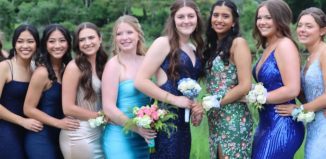D. None of the Above: The ‘Piano Man’ brings unity and welcome normalcy
By Daniel Dunaief

Finally, two years later, we were going to see Billy Joel. We had bought tickets to a concert in April of 2020, which was canceled because of the pandemic. The rescheduled event last year was also delayed.
An anticipation had been building that reminded me of the seemingly endless three years between the end of the Star Wars film “The Empire Strikes Back” and “Return of the Jedi.”
Within a few blocks of the stadium, we ran into the heaviest traffic we’d experienced in Charlotte, North Carolina since we arrived four years ago. My wife asked if I wanted her to park the car so I could make sure I was in our seats on time. I declined, knowing I didn’t want to experience any part of the evening without her.
While we sat in our car, waiting for the slow line to move, we watched as many of the people heading to the stadium were our age or older. We were either being nostalgic or hoping Billy Joel’s music could be our musical time machine.
We arrived at the stadium well before the 8 pm start time, where every seat gradually filled. When Joel started the concert at 8:30 with “My Life,” the packed crowd roared its heartfelt approval.
The weight of time — the two years anticipating this concert and the decades that passed since I first enjoyed the song’s lyrics and melody — quickly slipped off my shoulders.
Flashing lights from the stage and enlarged images of Billy Joel’s 72-year old fingers dancing across the piano keys created a visual spectacle. Accompanied by saxophone and trumpet players who would have blown the roof off the building if there were one, Joel thanked the crowd for coming after a long delay.
With songs from several albums through the 70s and 80s, Joel shared some of his biggest hits. People in the crowd played their own version of the show “Name that tune,” shouting out the song’s title as quickly as possible.
Thanks to Linda Ronstadt, who Joel said encouraged him to play “Just the Way You Are,” he included that love song. Joel said he and his wife, for whom he wrote that song, got divorced, so people shouldn’t listen to him.
But listen to him and his music we did. When the lights were off, the packed crowd swayed back and forth, holding up cell phones with lit camera lights, the way previous generations of concertgoers held up their lighters.
As he’s done at other concerts I attended, Joel stopped singing and the band stopped playing during “Piano Man” while the audience sang the chorus, “Sing us a song you’re the piano man. Sing us a song tonight. Well, we’re all in the mood for a melody and you’ve got us feeling alright.” I’m sure I wasn’t the only one with a smirk and goosebumps.
Swaying and singing in our seats, we were active participants in this long-awaited evening out, allowing ourselves to enjoy moments of unity.
Not as spry as he’d been decades ago, Joel moved more gingerly. He still shared his storytelling and lyrical voice, captivating an appreciative crowd. In between tunes, he noodled at the piano, as if he weren’t in an enormous football stadium in North Carolina below the image of a ferocious panther but was, rather, in a piano bar somewhere in New York City. He said the “key” to his longevity was “not dying.”
When the nighttime air got too hot for us, a light wind, which is uncharacteristic for Charlotte, washed over our skin. Leaning in, my wife smiled and whispered, “cue the breeze.”
The music itself reached much deeper than the wind, refreshing our souls and allowing us to revisit people like Sergeant O’Leary, the old man making love to his tonic and gin, and the “Big Shot.”







